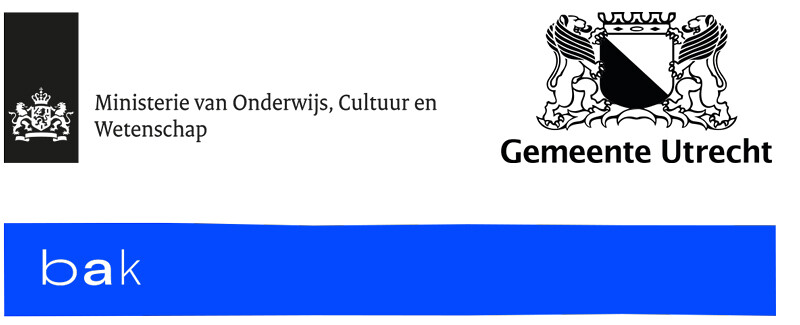September 15–December 15, 2020
Pauwstraat 13a
3512 TG Utrecht
The Netherlands
Hours: Wednesday–Sunday 12–6pm
T +31 30 231 6125
info@bakonline.org
BAK, basis voor actuele kunst, Utrecht is proud to announce our BAK 2020 Fellows. The following fifteen outstanding practitioners in arts, theory, and social action from the Netherlands and abroad have been invited for their advanced artistic, organizing, and other expressive practices, interdisciplinary excellence, critical insight, and collaborative strategies: Yasmin Ahmed (organizer and facilitator; Amsterdam), Selçuk Balamir (postcapitalist designer, commoning researcher, and climate justice organizer; Amsterdam), Colored Qollective (organizers and platform; Utrecht), Triwish Hanoeman (rapper and producer; Utrecht), Stefano Harney (educator and writer; Brasília), Adrian Heathfield (curator and writer; London); Aylin Kuryel (academic and documentary maker; Amsterdam and Istanbul), Grace Lostia (food and community activist; Utrecht), Mitchy Mallorca Saturay (theater artist and writer; Utrecht), Massimiliano Mollona (writer, filmmaker, and anthropologist; London), Louis Moreno (urbanist and theorist; London), Mutual Support Platform (artists, organizers and platform, Utrecht), Shay Raviv (social designer, researcher, and project initiator; Utrecht and Amsterdam), Irit Rogoff (writer, teacher, curator, and organizer; London), and Nora Sternfeld (educator and curator; Bergen).
The BAK 2020 Fellowship program is a three-month program, taking place in autumn 2020, organized in two parallel strands. Within the first strand, nine Fellowships are awarded to practitioners engaged with local communities and struggles for developing a focus on long lasting, mutual support with and through BAK as a public art institution. Former BAK Fellow and artist Jeanne van Heeswijk joins this strand as BAK Associate to conceptually guide the research and work on forms of proximity and building connections. Within the second strand, six Fellowships are awarded to researchers within the network freethought for developing their research on “spectral infrastructures.”
Since 2017, BAK conducts a post-academic Fellowship Program with, at its center, research on reframing and rethinking conditions of the contemporary through politically driven art-making and inquiry. The Fellowship Program offers research positions to Netherlands- and internationally-based practitioners at the intersection of art, theory, and social action. With each iteration of the Fellowship, BAK Associates help guide the foci of the collaborative research and study practices. BAK Fellows’ research speak to collective processes, artistic research, infrastructural transformation, and have specific affinity to BAK’s current trajectory Propositions for Non-Fascist Living (2017–ongoing), which engages aesthetico-political experimentation with and around the urgencies of the present. The Fellowship Program develops talent and critical practice, and fosters artistic and theoretical inquiry in concert with the public projects of BAK, advancing the notion of art as a public sphere and a political space.
Exploring the possibilities of art as a public good and a site of public pedagogies, the 2020 Fellowship experiments with and develops formats, practices, collaborative processes, social imagination, theory, and anticipatory learning methods so as to shape the program in the forthcoming funding period 2021–2024 with BAK. A driving force of this edition is to strengthen the invited Fellows’ research, practice, ability to sustainably work for causes and struggles they are politically and personally aligned with, as well as to nourish connection and collaboration, and further build their long term involvement with BAK.
BAK Fellowships are low-residential. BAK Fellows regularly gather at BAK and other physical and virtual spaces for Fellows Intensives with visiting artists, scholars, and other cultural practitioners, as well as public programming, visits, and collaborations with various organizations in the Netherlands and beyond. Thanks to collaborations with HKU University of the Arts, in particular, the Fellows broaden their research practices through exchanges with students and other cultural practitioners in their respective fields.



